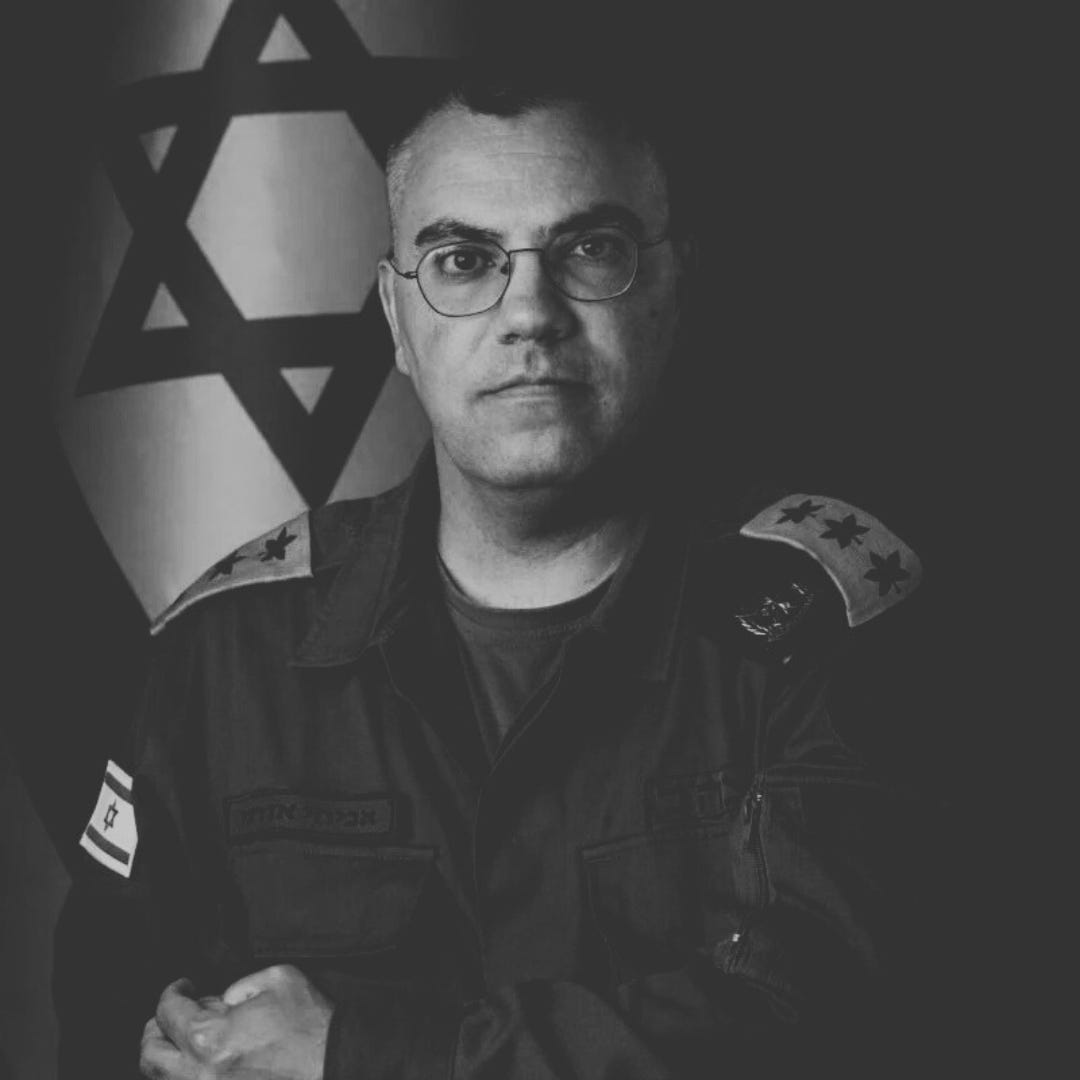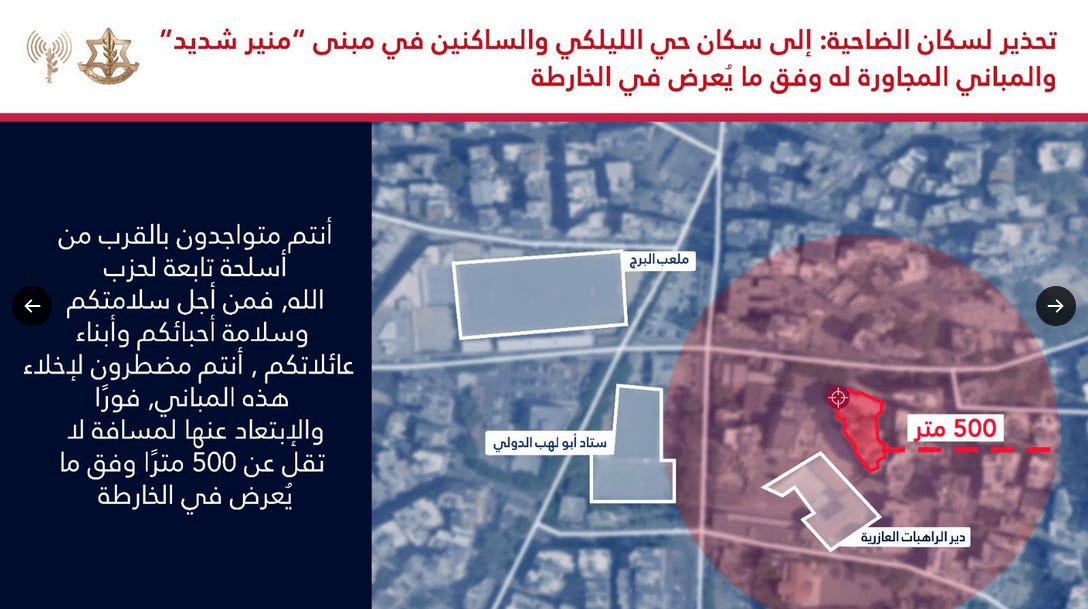In Lebanon the Face of Death is a 42 year Old Israeli Man
The Ghosts of Israel's Future, Part III
Hauntologies essays and articles are mostly free but some are paywalled. To gain access to all of this websites’ archives, please consider a paid subscription. By doing so, you will gain access to all the archives.
It’s become a nightly routine. As many seek to maintain a semblance of normality, they fall back on familiar habits. A drink. Dinner. Scrolling through your phone. Netflix. Whatever.
Whatever your day was like, part of you needs to be able to wind down. It's only fair. The alternative is existing in anticipation of Israeli bombs all the time.
Is it one of those night?
It depends. Did Avichay say anything?
No. Not yet. He just posted on social media. Where is it? Dahieh. Bint Jbeil. Haret Hreik. Beirut. Baalbeck. How many? Not here. Here. That was close. Did they kill someone? Who is he? Seven kids also dead. Fuck. 10 firefighters. A teacher. Some grandma. A guy is joking under the rubble, asking rescuers to bring him a shisha. A woman can't find her son. The hospitals are overrun. They were overrun yesterday.
Achichay Adraee is the Israeli Occupation Force's Arabic spokesperson, a position he's held since 2006. As such, some us remember him from the last time the Israelis bombed Gaza. And the one before that. And the one before that. Here he is being the IOF spokesperson in 2009, a year after one of their bombings of Gaza.
Given his role, he has become a familiar face to many, more than Netanyahu himself. Netanyahu doesn't speak Arabic. He doesn't even bother with Arabic subtitles when he is 'addressing the people’ of Gaza or Lebanon.
Avichay does. He's of Iraqi-Syrian origins. He looks like some guy I went to school with. I could have sworn I played Pokemon with him when I was kid. There is an intimacy there. I could be forgiven for thinking, somewhere at the back of my mind, even if for a moment, that maybe he is on our side.
He can talk to us, which means he can also listen to us. Unlike most Israelis, Avichay can watch a video of a grieving mother in Gaza and know exactly what she's saying. He understands those two girls who found a man they thought looks like their murdered father and got attached to him. He understands that man who lost his wife and newborn twins as he was coming home after registering them.
Avichay Adraee understood Hind Rajab's final phone call.
Sometimes, before an Israeli airstrike hits your building, you see him on your television or hear his voice on the radio. Maybe you see or hear him after again, as he explains to you why the IOF ‘had’ to bomb that school-turned-shelter.
These days, you may also see his social media posts with the target, in red, of where they are about to strike surrounded by a circle of death.
You check your map app and see what's around it. The IOF names some places for you to look up. It's next to a gas station. There's a church down on the right. Is this the museum? It feels weird seeing your neighborhood mapped out by the ones planning to bomb it. That cul-de-sac was supposed to be a secret hideout place for you and your friends. The Israelis knew all about it all along? Is anything truly yours?
You don't know when. Sometimes they tell you it's imminent. They’re going to bomb. Soon. Sometimes they don't tell you at all. You find out when you find out. Or they announce it at 3:00am local time, which is the same as not announcing it at all.
When they do strike, it could be a 'small' one. Or 10 of them. It could also be a massive bomb. Or 10 of them. They say this one's targeted. It took down an entire building. What happens when they don't target?
When your enemy is a civilian population you cannot just bomb them all the time. It's too expensive. It's counter-productive too. You don't have unlimited supplies. You don't have enough troops either.
What you can do instead is use the element of surprise as a tool of terror. If people in Lebanon knew in advance where the Israelis would strike and when, many might get 'used' to it. After 100 of these, you might check when Avichay announces the next targets. If you're not there, cool. If you are, you run. But at least you know you don't have to run unless they tell you to.
Avichay announces death, and death comes.
Everyone waits for him to tell them whether tonight is the night they are given 30 or 60 minutes. If they're lucky, they get a couple of hours to leave their homes, maybe permanently.
The face of death in Lebanon is a 42 year old Israeli man.
The other extreme doesn't work either. If you don't ever give warnings, the PR might be too bad. Unlike in Gaza, there are many Western journalists in Beirut. If you don't ever tell people in advance, you cannot minimize Western deaths. Beirut still has flights. It is not (yet) blockaded. People can still come in and out from the one airport we have. Westerners can still come to Lebanon, and that's risky for Israelis. They, Westeners, are the only ones whose lives are worth anything, after all.
To make sure people in Lebanon are always on edge, the Israelis alternate.
Sometimes they warn. Other times they surprise. Repeat. They just did that tonight. They bombed two areas of Beirut, leveling a four-storied building in the process, without warning. Over 20 killed, over 110 injured. A family of five is among the dead, including a little girl and an older boy. The numbers will go up. Repeat.
An hour or two after that, they ordered two sites in Dahieh evacuated. So they told us after not telling us. They decide when to let us know and let us know, maybe. Repeat.
Military defeat is not sufficient for a genocidal ideology. It requires civilians to also feel terrorized and humiliated, down to their very bones. Terror is an end in itself, and for the past two decades terror was personified by the voice and face of Avichay Adraee.
This is something else the Israelis do not seem to understand: a 'peace' with Lebanon. It is not impossible. After all, there are many warring nations that make peace.
What makes Israel such a reviled state in Lebanon is precisely the lengths they take to terrorize civilians. They come up with elaborate schemes like double tap: they bomb a place, they wait for rescuers to come, and then they bomb the rescuers. They target children, teachers, journalists, medics.
The photo reads: “Dahieh is not Beirut.” You're from Dahieh and you thought you were in Beirut? Think again: Avichai says no.
What's scary is not simply their superior military power. That's not as impressive as they probably think it does. Billions of US tax dollars are sent to Israel all the time. It's the only reason they can sustain this after a year. There is a disparity in resources available to all sides of this nightmare.
What makes them scary is the knowledge that they have of us. We’ve seen the maps. It's like being in a Soviet Gulag and finding out that your twin is one of the guards.
While the Israelis force thousands in Gaza to bury their children, and increasingly so in Lebanon and the West Bank as well, Avichay serves as a reminder that they do have the capacity to listen to grieving parents.
They choose not to, and this is what makes them so terrifying. Like death, Avichay seems to know you. And like death, when he comes for you there is nothing you can do about it.





Holy hell. Unholy hell. Bloody hell . Thank you for helping us understand the fine nuances if terror then writ large. I think if all the propaganda radio characters of WW2 talking about the hopelessness of their situation. & to surrender. Now morphed into this. Unholy bloody hell.